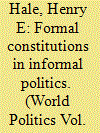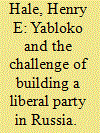|
|
|
Sort Order |
|
|
|
Items / Page
|
|
|
|
|
|
|
| Srl | Item |
| 1 |
ID:
163792


|
|
|
|
|
| Summary/Abstract |
How do people form beliefs about the factual content of major events when established geopolitical orders are violently challenged? Here, we address the tragic events of 2 May 2014, in Odesa, Ukraine. There, Euromaidan protest movement supporters and opponents clashed following Russia’s annexation of Crimea and the onset of the Donbas conflict, culminating in the worst civilian death toll the city had seen since World War II. Shortly after, we surveyed Ukraine’s population about who they thought had actually perpetrated the killings and relate people’s answers to alternative narratives (frames) that an original content analysis finds were available to Ukrainian citizens through different media. We find evidence, consistent with theories of hot cognition and motivated reasoning, that the Odesa violence triggered emotional responses linked to ethnic, regional, and partisan identity, which then activated attitudes associated with these identities that, in turn, led people to adopt very different (sometimes highly improbable) beliefs about who carried out the killings. Ethnic identity in particular is found to have strongly moderated the effects of television, with Ukrainian television greatly influencing Ukrainians but backfiring among Russians, and Russian television mainly impacting non-Ukrainians. Education and local information are found to reduce susceptibility to televised factual narratives.
|
|
|
|
|
|
|
|
|
|
|
|
|
|
|
|
| 2 |
ID:
173892


|
|
|
|
|
| Summary/Abstract |
Do international economic sanctions backfire politically, resulting in increased rather than decreased domestic support for targeted state leaders? Backfire arguments are common, but researchers have only recently begun systematically studying sanctions’ impact on target-state public opinion, not yet fully unpacking different possible backfire mechanisms. We formulate backfire logic explicitly, distinguishing between ‘scapegoating’ and ‘rallying’ mechanisms and considering the special case of ‘smart sanctions’ aimed at crony elites rather than the masses. We test five resulting hypotheses using an experimental design and pooled survey data spanning the imposition of sanctions in one of the most substantively important cases where the backfire argument has been prominent: Western sanctions on Russia in 2014. We find no evidence of broad sanctions backfire. Instead, sanctions have forced Russia’s president to pay a political price. But this price has been low compared to the massive political benefits we document arising from the sanctions-triggering event, the Crimea annexation. Moreover, hidden by aggregate figures are signs of a ‘backlash of the better-off’ by which ‘smart’ sanctions turn economic well-being from a predictor of opposition into a predictor of regime support.
|
|
|
|
|
|
|
|
|
|
|
|
|
|
|
|
| 3 |
ID:
052719


|
|
|
| 4 |
ID:
108024


|
|
|
| 5 |
ID:
170199


|
|
|
|
|
| Summary/Abstract |
Brancati and Lucardi’s findings on the absence of “democracy protest” diffusion across borders raise important questions for the future of protest studies. I argue that this subfield would benefit from a stronger engagement with theory (in general) and from a “patronal politics” perspective (in particular) when it comes to researching protest in non-democratic regimes. This means curtailing a widespread practice of linking the study of protest with the study of democratization, questioning the dominant “contentious politics” framework as commonly conceptualized, and instead focusing more on the central role of patronal network coordination dynamics (especially elite splits) in driving both protest and the potential for regime change. This perspective emphasizes the role of domestically generated succession expectations and public opinion in generating the most meaningful elite splits, and reveals how protests can be important instruments in the resulting power struggles among rival networks. It accounts not only for why democracy protests do not diffuse from neighbor state to neighbor state as per Brancati and Lucardi, but also for the timing and distribution of protests related to the 1989 downfall of communist systems in Europe, the post-Soviet Color Revolutions of 2003-05, the collapse of regimes in the 2011 Arab Spring, and the apparent failure of many other protest attempts to force far-reaching regime change.
|
|
|
|
|
|
|
|
|
|
|
|
|
|
|
|
| 6 |
ID:
107051


|
|
|
|
|
| Publication |
2011.
|
| Summary/Abstract |
The article presents new survey research, sensitive to local understandings of key terms, that helps resolve a longstanding debate on whether Russian public opinion generally supports democracy or authoritarianism. The central conclusion is that while Russians differ amongst themselves, they are best understood not as autocratic but as generally supportive of a particular form of democracy that social scientists have called 'delegative democracy'. This logically consistent preference structure reconciles diverse arguments and findings in the literature, sheds light on Putin's puzzling decision to cede the presidency to Medvedev in 2008, and offers insight into the public opinion foundations of 'hybrid regimes'.
|
|
|
|
|
|
|
|
|
|
|
|
|
|
|
|
| 7 |
ID:
071930


|
|
|
|
|
| Publication |
2005.
|
| Summary/Abstract |
Research on regime change has often wound up chasing events in the post-Soviet world because it has frequently assumed that regime change, if not simple instability, implies a trajectory toward a regime-type endpoint like democracy or autocracy. A supplemental approach recognizes that regime change can be cyclic, not just progressive, regressive, or random. In fact, regime cycles are much of what we see in the postcommunist world, where some states have oscillated from autocracy toward greater democracy, then back toward more autocracy, and, with recent "colored revolutions," toward greater democracy again. An institutional logic of elite collective action, focusing on the effects of patronal presidentialism, is shown to be useful in understanding such cyclic dynamics, explaining why "revolutions" occurred between 2003 and 2005 in Ukraine, Georgia, and Kyrgyzstan but not in countries like Russia, Azerbaijan, and Uzbekistan.
|
|
|
|
|
|
|
|
|
|
|
|
|
|
|
|
| 8 |
ID:
152134


|
|
|
|
|
| Summary/Abstract |
Russian politics from the tsars through Vladimir Putin has been shaped by patronalism, a social equilibrium in which personal connections dominate, collective action happens primarily through individualized punishments and rewards, and trends in the political system reflect changing patterns of coordination among nationwide networks of actual acquaintances that typically cut across political parties, firms, nongovernmental organizations, and even the state. The “chaotic” Yeltsin era reflects low network coordination, while the hallmark of the Putin era has been the increasingly tight coordination of these networks’ activities around the authority of a single patron. In at least the next decade, Russia is unlikely to escape the patronalist equilibrium, which has already withstood major challenges in 1917 and 1991. The most promising escape paths involve much longer-term transitions through diversified economic development and integration with the Western economy, though one cannot entirely rule out that a determined new ruler might accelerate the process.
|
|
|
|
|
|
|
|
|
|
|
|
|
|
|
|
| 9 |
ID:
107258


|
|
|
| 10 |
ID:
153783


|
|
|
|
|
| Summary/Abstract |
Under what conditions do individuals withdraw support from dominant parties in nondemocratic regimes? Employing an original panel survey, we measure the same individuals’ support for Russia's dominant party first at the peak of its dominance in 2008 and again shortly after it suffered a cascading defection of regime supporters in 2011–12. This allows us uniquely to explore the microfoundations of theories of regime defection cascades, generally supporting the argument that they involve complex “informational” as well as “reputational” processes. Accordingly, we find that early and eager movers in such a cascade tend to come from less socially vulnerable segments of the population, to have greater need to rely on other people for interpreting events, to believe the regime has lower levels of popular support, and to come from more heterogeneous communities. We find little role for mass media (including social media) or democratizing zeal in driving Russia's regime defection cascade.
|
|
|
|
|
|
|
|
|
|
|
|
|
|
|
|
| 11 |
ID:
057706


|
|
|
|
|
|
|
|